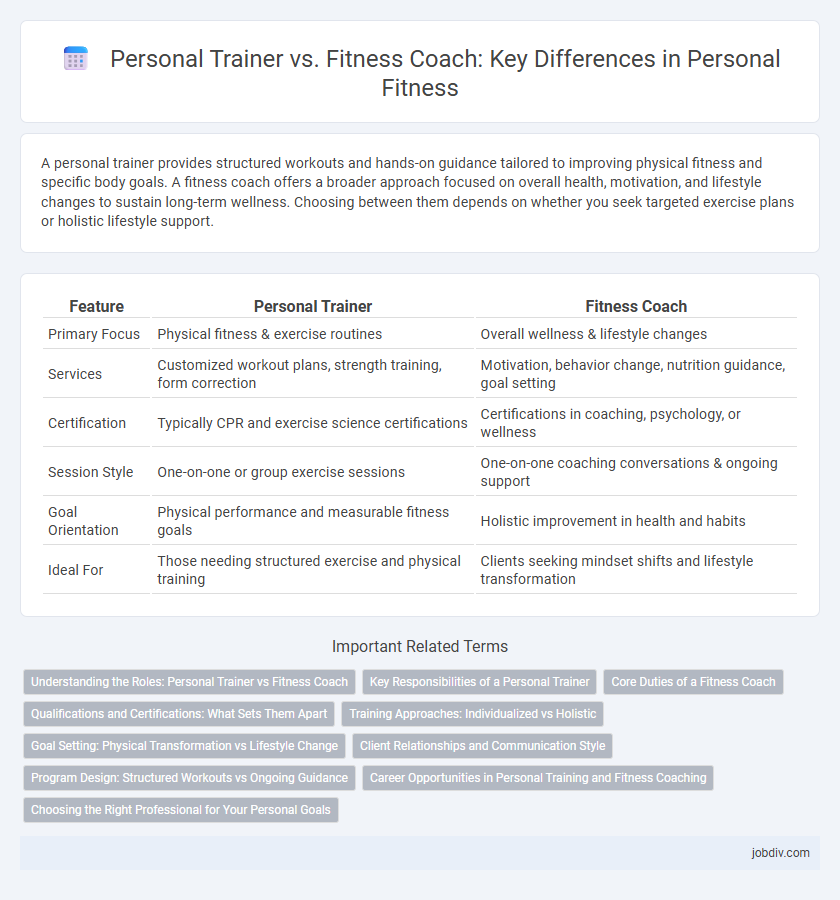A personal trainer provides structured workouts and hands-on guidance tailored to improving physical fitness and specific body goals. A fitness coach offers a broader approach focused on overall health, motivation, and lifestyle changes to sustain long-term wellness. Choosing between them depends on whether you seek targeted exercise plans or holistic lifestyle support.
Table of Comparison
| Feature | Personal Trainer | Fitness Coach |
|---|---|---|
| Primary Focus | Physical fitness & exercise routines | Overall wellness & lifestyle changes |
| Services | Customized workout plans, strength training, form correction | Motivation, behavior change, nutrition guidance, goal setting |
| Certification | Typically CPR and exercise science certifications | Certifications in coaching, psychology, or wellness |
| Session Style | One-on-one or group exercise sessions | One-on-one coaching conversations & ongoing support |
| Goal Orientation | Physical performance and measurable fitness goals | Holistic improvement in health and habits |
| Ideal For | Those needing structured exercise and physical training | Clients seeking mindset shifts and lifestyle transformation |
Understanding the Roles: Personal Trainer vs Fitness Coach
Personal trainers specialize in designing and supervising individualized workout plans to improve clients' physical fitness and achieve specific health goals. Fitness coaches take a broader approach by integrating motivation, lifestyle guidance, and long-term habit building to support overall wellness and sustainable fitness routines. Both roles require expertise in exercise science, but personal trainers focus more on technical exercise execution while fitness coaches emphasize behavioral change and personalized coaching strategies.
Key Responsibilities of a Personal Trainer
Personal trainers design customized workout plans tailored to individual fitness goals, ensuring proper exercise technique and safety. They monitor progress through regular assessments and adjust routines to optimize results, providing motivation and accountability. Key responsibilities include conducting fitness evaluations, educating clients on nutrition basics, and offering continuous support to enhance overall physical performance.
Core Duties of a Fitness Coach
A Fitness Coach primarily focuses on enhancing overall physical performance through personalized exercise programming, nutritional guidance, and lifestyle management. They assess clients' fitness levels, set realistic goals, and provide motivation to improve strength, endurance, and flexibility. Unlike personal trainers who often concentrate on specific workouts, fitness coaches integrate long-term health strategies and behavior change techniques.
Qualifications and Certifications: What Sets Them Apart
Personal trainers typically hold certifications from organizations like ACE, NASM, or ISSA, which emphasize exercise science, anatomy, and client safety. Fitness coaches often possess broader qualifications that include nutrition, mental wellness, and lifestyle management, sometimes backed by certifications from entities such as ICF or specialized wellness institutes. The distinction in qualifications shapes their approach, with personal trainers focusing on personalized workout plans and fitness coaches addressing holistic health improvement.
Training Approaches: Individualized vs Holistic
Personal trainers focus on individualized training approaches, tailoring workout plans to meet specific fitness goals, body types, and abilities. Fitness coaches adopt a holistic approach that integrates physical training with nutrition, mental wellness, and lifestyle changes for overall well-being. Choosing between a personal trainer and a fitness coach depends on whether targeted physical improvement or comprehensive health guidance is desired.
Goal Setting: Physical Transformation vs Lifestyle Change
Personal trainers specialize in goal setting for physical transformation, focusing on structured workout plans and measurable fitness milestones. Fitness coaches prioritize lifestyle change by integrating holistic health habits, including nutrition, mental well-being, and sustainable routines. This distinction highlights personalized training aimed at short-term body goals versus coaching that fosters long-term wellness and behavioral shifts.
Client Relationships and Communication Style
Personal Trainers typically emphasize structured workout plans and frequent progress assessments, fostering a direct and instructional communication style tailored to individual fitness goals. Fitness Coaches prioritize a holistic approach, incorporating motivation and lifestyle guidance through empathetic and collaborative interactions that build stronger emotional connections with clients. Both roles depend on clear, consistent communication, but Fitness Coaches often engage clients in goal-setting and problem-solving, enhancing long-term adherence and support.
Program Design: Structured Workouts vs Ongoing Guidance
Personal trainers create structured workout programs tailored to individual fitness levels and goals, often emphasizing specific exercises, sets, and repetitions for measurable results. Fitness coaches provide ongoing guidance that adapts to changing needs, focusing on motivation, technique, and lifestyle integration to sustain long-term health. The distinction lies in program design: personal trainers deliver precise, time-bound plans while fitness coaches offer dynamic support to foster continuous improvement.
Career Opportunities in Personal Training and Fitness Coaching
Career opportunities in personal training primarily revolve around one-on-one client sessions, focusing on tailored workout plans and physical fitness goals. Fitness coaching expands into group training, wellness consulting, and online program development, offering broader roles in lifestyle and nutritional guidance. Both careers demand certifications and offer potential growth in gym management, corporate wellness programs, and entrepreneurial ventures.
Choosing the Right Professional for Your Personal Goals
Selecting between a personal trainer and a fitness coach depends on your specific goals, such as weight loss, muscle gain, or athletic performance. Personal trainers focus on designing tailored workout routines and ensuring proper exercise form, while fitness coaches offer broader guidance encompassing motivation, nutrition, and lifestyle habits. Understanding these distinctions helps you invest in the professional best suited to achieve your personal fitness objectives effectively.
Personal Trainer vs Fitness Coach Infographic

 jobdiv.com
jobdiv.com